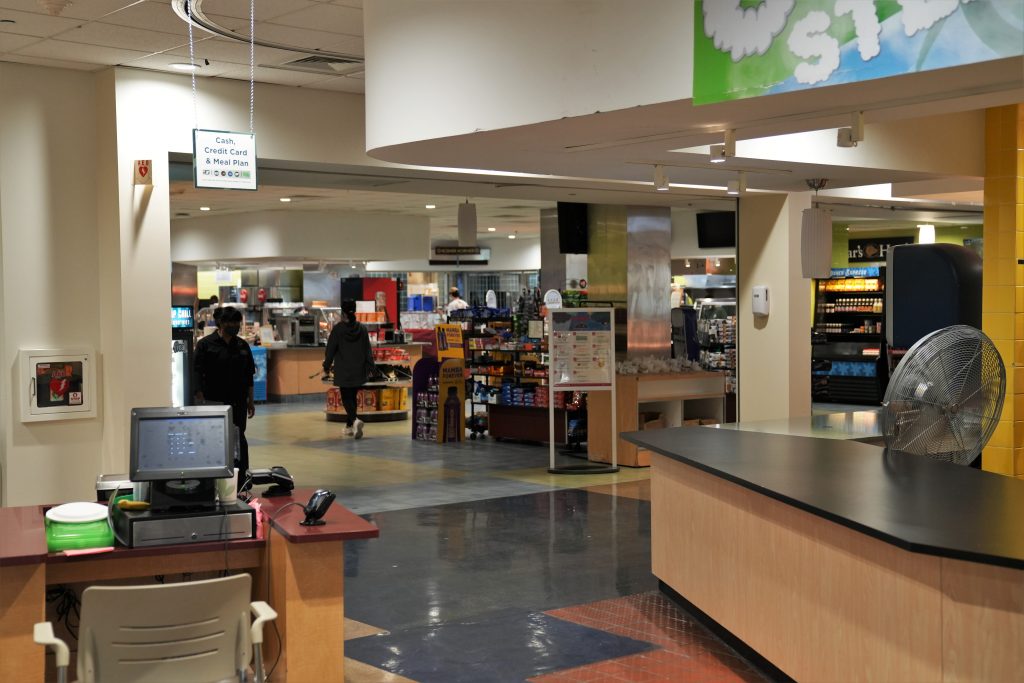Last week, the Student Association’s (SA) Dining Services and Campus Food Committee released a report which included both the results of their monthlong survey and new recommendations for Binghamton University Dining Services (BUDS).
The results of the survey revealed that 72.5 percent of participants reported having friends who experienced digestive issues due to the quality of campus food, and that 58.3 percent of participants reported having experienced those issues themselves. The results also revealed that 98.6 percent of participants support the idea of having a committee to address campus dining issues. Recommendations made by the committee regarding BUDS included expanded dining hall hours, more nutritious Nite Owl options, expanded kosher and halal options and the creation of a dining bill of rights.
The committee was founded earlier in the semester after there was a spike in reports of possible food poisoning on campus. It was created with the intent of addressing complaints or suggestions for BUDS. Currently, the committee is temporary and will expire at the end of the semester. However, a resolution was proposed in the April 12 SA meeting calling for its permanence.
Samil Levin, chairman of the committee and sophomore majoring in economics, discussed the importance of making the committee permanent.
“The recommendations made take time and persistence to implement,” Levin wrote in an email. “That’s why [this committee] should become permanent so that the work started this semester does not go to waste. Additionally, it is easier to advocate for students when administrators know the committee will be staying around.”
The committee also focused many of its recommendations on more halal and kosher options for those who need them, as well as expanded hours and food offerings, including opening Hinman Dining Hall before 8 a.m. for breakfast.
With the recommendations of more halal and kosher options, the report also stated there was a general lack of options on campus, especially during Ramadan, where Muslim students do not eat or drink from sunrise to sundown.
“There are currently no formal meal accommodations for fasting students,” the report reads. “Using the entirety of our budget from the [SA], the Muslim Student Association is providing iftars, the meals where students break their fast, free of charge five days a week.”
Levin said providing additional kosher and halal meal options would help many students.
“The kosher and halal recommendations are important to make sure that the students who need to eat there have access all the time,” Levin wrote. “Our recommendations focused on expanded hours (especially breakfast) and new food offerings.”
The committee has also recommended the time between dining hall food offerings of lunch and dinner to be cut down to 30 minutes, whereas it is currently an hour at some dining halls — with limited options in between.
“During these waiting times, food is available at the salad bar and other grab-and-go, but not the hot meals most students seek when they come to the dining halls,” the report reads. “This leads to awkward moments where students are unable to snatch a hot meal between classes and thus rely on snacks to get by. Students should not substitute actual meals (breakfast, lunch) with snacks, it is not healthy and leads to poor performance in classrooms.”
In addition, the committee recommended a dining bill of rights, a document which lists and informs students of the rights they have in campus dining. One of the rights to be included is the right to a refund if students believe their food is erroneously prepared, a right the committee says must be clearly stated and easily accessible to all students.
Lori Benson, the marketing director of BUDS, said she hopes to read the recommendations.
“I did not attend the meeting and I’m not aware of the recommendations, but I look forward to learning more about them,” Benson wrote in an email.
Levin said that while BUDS has accepted all the recommendations so far, the job of the committee is still far from finished.
“[BUDS] has not said no to anything,” Levin wrote. “However, it is a matter of time and persistence to make sure the implementation of these recommendations take place. That’s a big reason why the committee should continue to exist.”
James Jacovetti, a sophomore majoring in business administration, expressed support for a new 30-minute break between lunch and dinner.
“The amount of times I’ve gone for food around 3 [p.m.] to 4 p.m., in between my classes, and found no food available is ridiculous,” Jacovetti said. “I know that it might be logistically a hassle for the dining halls, but it’s a hassle for me to go every day with minimal food, and I’m the one paying for them.”
Jeremy Cazes, a resident of College-in-the-Woods and a junior majoring in business administration, said he thought there should never be time when there is no food available at the dining halls.
“The reduction of the time between the hours is a good thing for students,” Cazes said. “The bill of rights sounds kind of excessive. Rather than it being the student’s responsibility to be aware of their rights, the dining hall staff should be cognizant of them when performing their tasks.”



